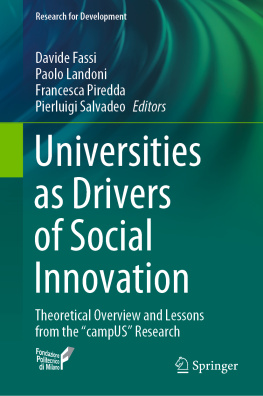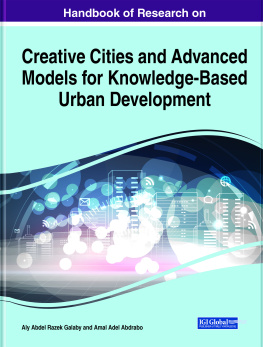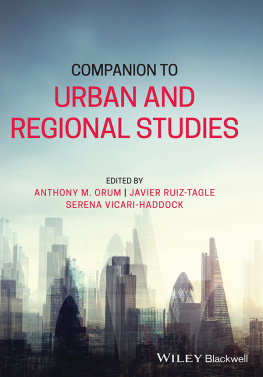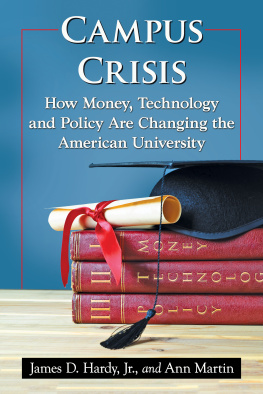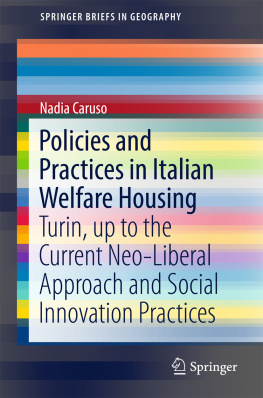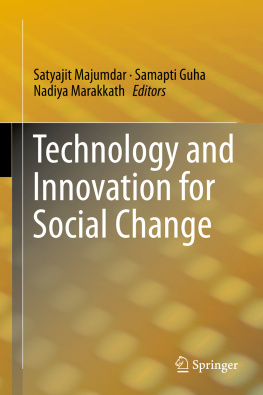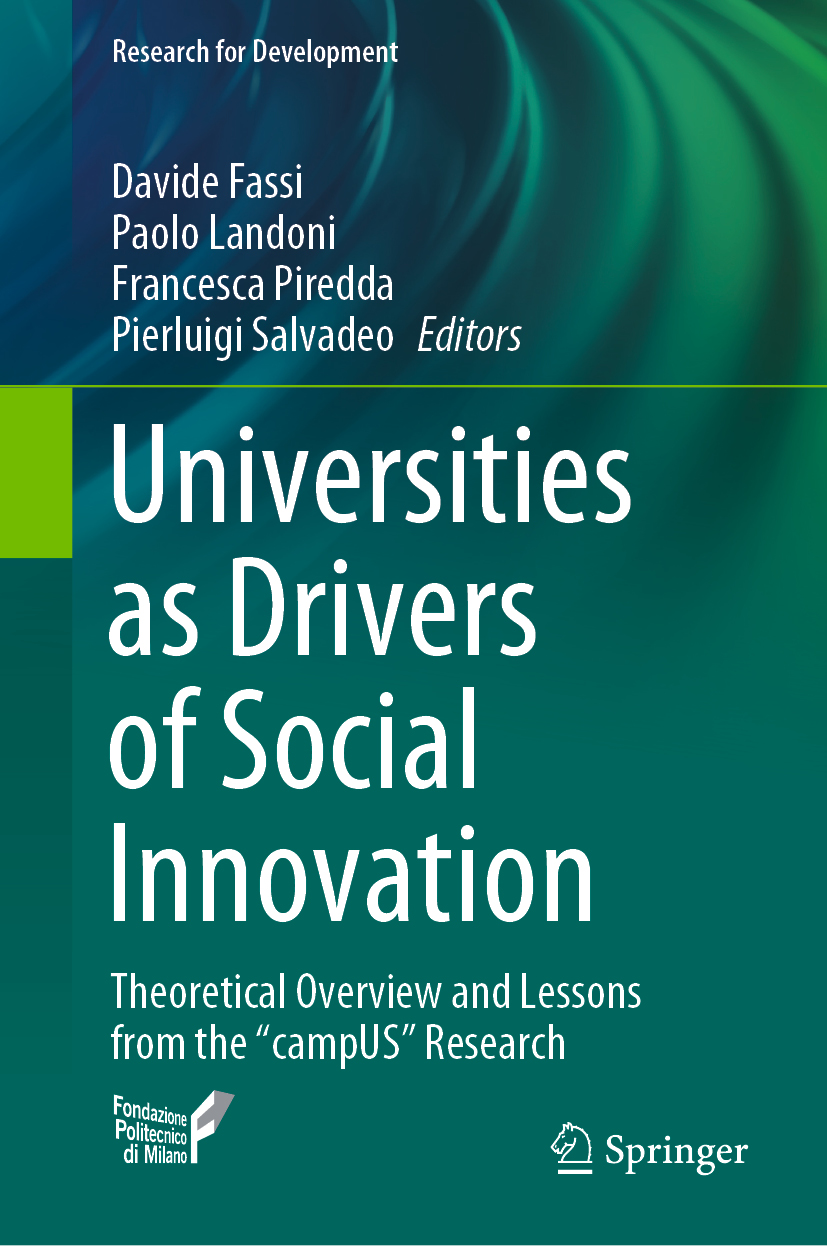Research for Development
Series Editors
Emilio Bartezzaghi
Milan, Italy
Giampio Bracchi
Milan, Italy
Adalberto Del Bo
Politecnico di Milano, Milan, Italy
Ferran Sagarra Trias
Department of Urbanism and Regional Planning, Universitat Politcnica de Catalunya, Barcelona, Barcelona, Spain
Francesco Stellacci
Supramolecular NanoMaterials and Interfaces Laboratory (SuNMiL), Institute of Materials, Ecole Polytechnique Fdrale de Lausanne (EPFL), Lausanne, Vaud, Switzerland
Enrico Zio
Politecnico di Milano, Milan, Italy
Ecole Centrale Paris, Paris, France
The series Research for Development serves as a vehicle for the presentation and dissemination of complex research and multidisciplinary projects. The published work is dedicated to fostering a high degree of innovation and to the sophisticated demonstration of new techniques or methods.
The aim of the Research for Development series is to promote well-balanced sustainable growth. This might take the form of measurable social and economic outcomes, in addition to environmental benefits, or improved efficiency in the use of resources; it might also involve an original mix of intervention schemes.
Research for Development focuses on the following topics and disciplines:
Urban regeneration and infrastructure, Info-mobility, transport, and logistics, Environment and the land, Cultural heritage and landscape, Energy, Innovation in processes and technologies, Applications of chemistry, materials, and nanotechnologies, Material science and biotechnology solutions, Physics results and related applications and aerospace, Ongoing training and continuing education.
Fondazione Politecnico di Milano collaborates as a special co-partner in this series by suggesting themes and evaluating proposals for new volumes. Research for Development addresses researchers, advanced graduate students, and policy and decision-makers around the world in government, industry, and civil society.
THE SERIES IS INDEXED IN SCOPUS
More information about this series at http://www.springer.com/series/13084
Editors
Davide Fassi , Paolo Landoni , Francesca Piredda and Pierluigi Salvadeo
Universities as Drivers of Social Innovation
Theoretical Overview and Lessons from the campUS Research
Editors
Davide Fassi
Dipartimento di Design, Politecnico di Milano, Milan, Italy
Paolo Landoni
Department of Management and Production Engineering, Politecnico di Torino, Turin, Italy
Francesca Piredda
Dipartimento di Design, Politecnico di Milano, Milan, Italy
Pierluigi Salvadeo
Dipartimento Architettura e Studi Urbani, Politecnico di Milano, Milan, Italy
ISSN 2198-7300 e-ISSN 2198-7319
Research for Development
ISBN 978-3-030-31116-2 e-ISBN 978-3-030-31117-9
https://doi.org/10.1007/978-3-030-31117-9
Springer Nature Switzerland AG 2020
This work is subject to copyright. All rights are reserved by the Publisher, whether the whole or part of the material is concerned, specifically the rights of translation, reprinting, reuse of illustrations, recitation, broadcasting, reproduction on microfilms or in any other physical way, and transmission or information storage and retrieval, electronic adaptation, computer software, or by similar or dissimilar methodology now known or hereafter developed.
The use of general descriptive names, registered names, trademarks, service marks, etc. in this publication does not imply, even in the absence of a specific statement, that such names are exempt from the relevant protective laws and regulations and therefore free for general use.
The publisher, the authors and the editors are safe to assume that the advice and information in this book are believed to be true and accurate at the date of publication. Neither the publisher nor the authors or the editors give a warranty, expressed or implied, with respect to the material contained herein or for any errors or omissions that may have been made. The publisher remains neutral with regard to jurisdictional claims in published maps and institutional affiliations.
This Springer imprint is published by the registered company Springer Nature Switzerland AG
The registered company address is: Gewerbestrasse 11, 6330 Cham, Switzerland
Introduction
Davide Fassi
Paolo Landoni
Francesca Piredda
Pierluigi Salvadeo
This book is based on a research project calledcampUSIncubation and settings for social practiceswhich was funded under the2014 Polisocial Award, the Politecnico di Milanos social responsibility programme. It extends its framework of reference by supplementing it with the best practices that lay behind the actions undertaken, that is, by placing it within a broader international framework of reference which can guide the progress of scientific research, particularly in the field of social innovation.
Specifically, the publication posits and analyses the fundamental role that universities can play in guiding, fostering and testing scientific research in the context within which they operate. Indeed, there are already several examples of virtuous relationships between the spaces and skills that are present on university campuses and the local (physical and social) context in which they are situated. These projects create highly recognizable spaces which confer a strong sense of identity on them and which mobilize local communities through solutions that foster social cohesion and innovation. The publication tackles this paradigm from a variety of perspectives, in complementary subject areas, which involve profound differences in terms of methodology, potential impact, local legacy and the kinds of relationships that can be established with local stakeholders. Specifically, it analyses three areas of design that are implemented on different scales and over different standard time horizons, which have shown themselves to be central themes in the contemporary debate relating to research into social innovation, into co-design and into processes of open-source urban regeneration.
The three areas analysed, all of them ascribable to the principles of social innovation, regard:
the increasingly widespread and widely recognized practices of urban agriculture;
experiments relating to neighbourhood TV as a participatory model mixing co-design and participatory video practices, based on the assumptions that storytelling techniques and audio-visual language, foster self-expression and represent drivers for social inclusion;
innovative proposals for an open-source city, which is built by means of travelling or pop-up projects that can stand as drivers of urban regeneration;
Furthermore, the long-term economic sustainability of social innovation projects has been studied, and the results have been applied to the above-listed actions. The economic sustainability models have been developed with a focus on joint participation on the part of local stakeholders and accountability in the management of a public legacy.
These four research areas are investigated by three different research department at the Politecnico di Milano in the areas of Design, Architecture and Urban Studies, Management Engineering. The research aims to confirm the university as a stakeholder capable of addressing the various local communities, of mediating between public and private as well as collective and individual interests, of setting experimental processes in motion in each of the four fields mentioned above, dealing with administrative, social, technical and management issues while at the same time developing new participatory models in order to achieve the greatest possible degree of inclusion and engagement.

